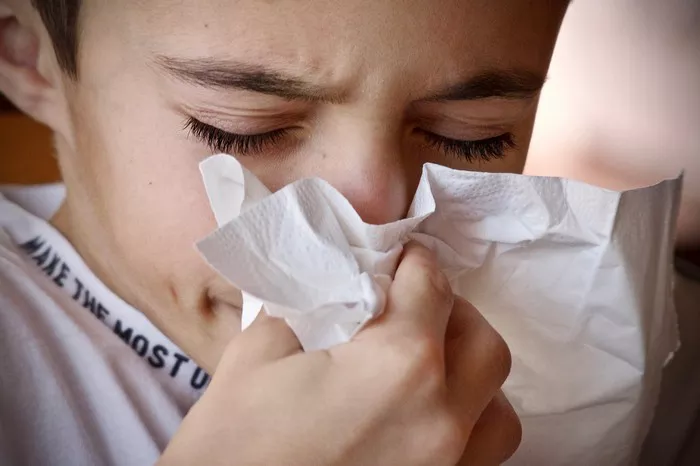Allergic rhinitis, commonly known as hay fever or nasal allergies, is a condition characterized by inflammation of the nasal passages in response to exposure to allergens. While allergic rhinitis itself is not a life-threatening condition, it can significantly impact quality of life and daily functioning if left untreated. In this comprehensive guide, we’ll delve into the different types of allergic rhinitis, the duration of symptoms for each type, factors influencing duration, and various management and treatment options available to alleviate symptoms and improve overall well-being.
Types of Allergic Rhinitis
Seasonal Allergic Rhinitis (Hay Fever)
Seasonal allergic rhinitis, also known as hay fever, is characterized by symptoms that occur during specific times of the year, typically triggered by outdoor allergens such as pollen from trees, grasses, or weeds. Symptoms may include sneezing, nasal congestion, runny nose, itchy or watery eyes, and itching of the nose, throat, or roof of the mouth. Seasonal allergies are often more prevalent in the spring and fall when pollen levels are highest, but they can occur at any time depending on the local climate and allergen exposure.
Perennial Allergic Rhinitis
Perennial allergic rhinitis refers to symptoms that persist year-round and are often triggered by indoor allergens such as dust mites, pet dander, mold, or cockroach droppings. Unlike seasonal allergies, perennial allergies can occur at any time of year and may be more challenging to manage due to continuous exposure to allergens in the indoor environment. Symptoms of perennial allergic rhinitis are similar to those of seasonal allergies and may include nasal congestion, sneezing, runny nose, and itching of the eyes, nose, or throat.
Duration of Symptoms
Seasonal Allergies
The duration of symptoms for seasonal allergic rhinitis can vary depending on individual sensitivities and the length of the pollen season in a particular region. In general, symptoms may last for a few weeks to several months during peak pollen seasons, such as spring or fall. However, individuals with severe allergies or prolonged exposure to allergens may experience symptoms for a longer duration or throughout the entire pollen season.
Perennial Allergies
Symptoms of perennial allergic rhinitis can be continuous or intermittent throughout the year, depending on the individual’s exposure to indoor allergens. For some individuals, symptoms may persist year-round due to ongoing exposure to dust mites, pet dander, or mold in the home or workplace. Others may experience periodic flare-ups triggered by changes in environmental conditions or increased allergen exposure.
Factors Influencing Duration
Allergen Exposure
The amount and duration of exposure to specific allergens play a significant role in determining the duration and severity of allergic rhinitis symptoms. Individuals with high sensitivity to allergens or prolonged exposure to indoor or outdoor allergens may experience more severe and persistent symptoms compared to those with minimal allergen exposure.
Individual Sensitivity
The individual’s immune system response to allergens can also influence the duration and severity of allergic rhinitis symptoms. Some individuals may have a heightened sensitivity to certain allergens, leading to more pronounced symptoms and longer-lasting allergic reactions. Factors such as genetics, underlying health conditions, and previous exposure to allergens can all contribute to individual variations in allergic rhinitis severity and duration.
Environmental Factors
Environmental factors such as weather conditions, air quality, and pollution levels can impact the severity and duration of allergic rhinitis symptoms. High pollen counts, humidity levels, and air pollution can exacerbate symptoms and prolong the duration of allergic reactions. Additionally, changes in temperature or weather patterns may trigger flare-ups in susceptible individuals, further contributing to symptom duration and severity.
Treatment and Management
Management and Treatment Options
Managing allergic rhinitis involves a combination of preventive measures, lifestyle modifications, and pharmacological interventions to alleviate symptoms and improve quality of life. Here are some effective strategies for managing and treating allergic rhinitis:
Avoiding Allergens
Reducing exposure to allergens is the cornerstone of allergic rhinitis management. Individuals should identify and avoid triggers such as pollen, dust mites, pet dander, mold, and other indoor or outdoor allergens whenever possible. Strategies may include using air purifiers, maintaining a clean and dust-free environment, and keeping windows closed during high pollen seasons.
Medications
Various medications are available to alleviate symptoms of allergic rhinitis and improve overall comfort. These may include:
1. Antihistamines: Block the effects of histamine, a chemical released during allergic reactions, to reduce symptoms such as sneezing, itching, and runny nose.
2. Decongestants: Help relieve nasal congestion by shrinking swollen blood vessels in the nasal passages.
3. Nasal corticosteroids: Reduce inflammation in the nasal passages to alleviate symptoms such as congestion, runny nose, and sneezing.
4. Immunotherapy: Involves gradually exposing the individual to small doses of allergens to desensitize the immune system and reduce allergic reactions over time.
Natural Remedies
Some individuals may find relief from allergic rhinitis symptoms using natural remedies or complementary therapies. These may include saline nasal rinses or neti pots to flush out allergens and irritants from the nasal passages, steam inhalation to relieve congestion, or herbal supplements such as butterbur or quercetin with antihistamine properties. However, it’s essential to consult with a healthcare provider before trying any natural remedies to ensure safety and effectiveness.
Seeking Medical Advice
Individuals with persistent or severe allergic rhinitis symptoms should seek medical advice from a doctor or allergist for proper diagnosis, treatment, and management. A healthcare provider can perform allergy testing to identify specific triggers and develop a personalized treatment plan tailored to the individual’s needs. In some cases, allergen immunotherapy may be recommended to desensitize the immune system and reduce allergic reactions over time. Additionally, individuals with underlying health conditions or complications may require specialized care and monitoring to manage allergic rhinitis effectively.
Conclusion: Navigating Allergic Rhinitis with Knowledge and Care
In conclusion, allergic rhinitis is a common condition characterized by inflammation of the nasal passages in response to exposure to allergens. While seasonal and perennial allergic rhinitis have distinct triggers and durations, both can significantly impact quality of life and daily functioning if left untreated. By understanding the types of allergic rhinitis, the duration of symptoms, factors influencing duration, and various management and treatment options available, individuals can navigate allergic rhinitis with knowledge and care. Through preventive measures, medication management, and seeking medical advice when needed, individuals can alleviate symptoms, improve overall well-being, and enjoy a better quality of life despite allergic rhinitis challenges.
[inline_related_posts title=”You Might Be Interested In” title_align=”left” style=”list” number=”6″ align=”none” ids=”6717,6711,6708″ by=”categories” orderby=”rand” order=”DESC” hide_thumb=”no” thumb_right=”no” views=”no” date=”yes” grid_columns=”2″ post_type=”” tax=””]
































